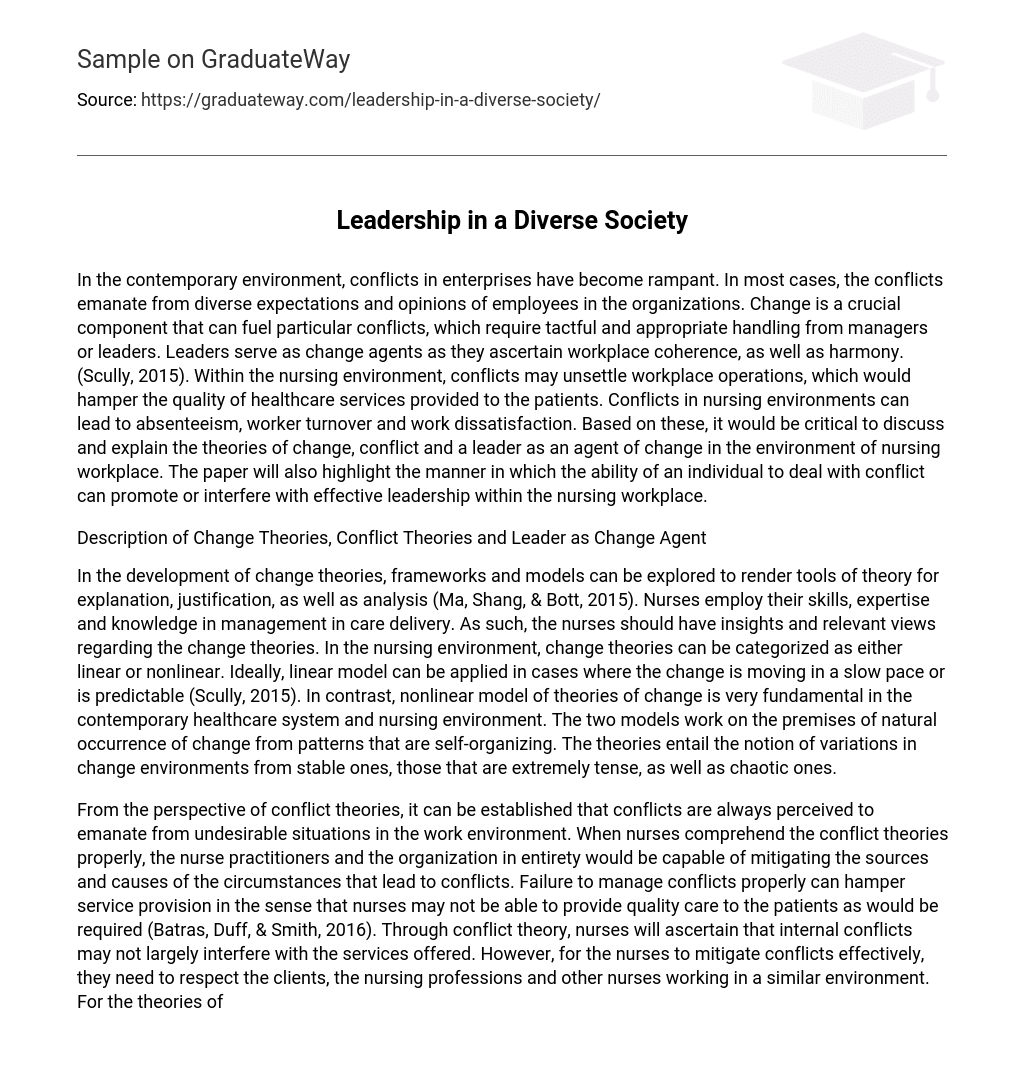In the contemporary environment, conflicts in enterprises have become rampant. In most cases, the conflicts emanate from diverse expectations and opinions of employees in the organizations. Change is a crucial component that can fuel particular conflicts, which require tactful and appropriate handling from managers or leaders. Leaders serve as change agents as they ascertain workplace coherence, as well as harmony. (Scully, 2015). Within the nursing environment, conflicts may unsettle workplace operations, which would hamper the quality of healthcare services provided to the patients. Conflicts in nursing environments can lead to absenteeism, worker turnover and work dissatisfaction. Based on these, it would be critical to discuss and explain the theories of change, conflict and a leader as an agent of change in the environment of nursing workplace. The paper will also highlight the manner in which the ability of an individual to deal with conflict can promote or interfere with effective leadership within the nursing workplace.
Description of Change Theories, Conflict Theories and Leader as Change Agent
In the development of change theories, frameworks and models can be explored to render tools of theory for explanation, justification, as well as analysis (Ma, Shang, & Bott, 2015). Nurses employ their skills, expertise and knowledge in management in care delivery. As such, the nurses should have insights and relevant views regarding the change theories. In the nursing environment, change theories can be categorized as either linear or nonlinear. Ideally, linear model can be applied in cases where the change is moving in a slow pace or is predictable (Scully, 2015). In contrast, nonlinear model of theories of change is very fundamental in the contemporary healthcare system and nursing environment. The two models work on the premises of natural occurrence of change from patterns that are self-organizing. The theories entail the notion of variations in change environments from stable ones, those that are extremely tense, as well as chaotic ones.
From the perspective of conflict theories, it can be established that conflicts are always perceived to emanate from undesirable situations in the work environment. When nurses comprehend the conflict theories properly, the nurse practitioners and the organization in entirety would be capable of mitigating the sources and causes of the circumstances that lead to conflicts. Failure to manage conflicts properly can hamper service provision in the sense that nurses may not be able to provide quality care to the patients as would be required (Batras, Duff, & Smith, 2016). Through conflict theory, nurses will ascertain that internal conflicts may not largely interfere with the services offered. However, for the nurses to mitigate conflicts effectively, they need to respect the clients, the nursing professions and other nurses working in a similar environment. For the theories of conflict to be executed efficiently, there is the need to understand the reasons for occurrence of conflicts and identify the best strategies to incorporate in dealing with such situations.
Nurse leaders can mediate the conflict resolution process, which would enable them to minimize problems brought forth by the conflicts and manage the working environment appropriately. In this way, the nurses and patients will develop good relationships thereby making it efficient to meet the needs of the clients (Ma et al. 2015). Additionally, conflict resolution can be enhanced by adopting effective skills for communication. Since conflict theories encompass comprehensions concerning the causes of conflicts, it would be vital to consider the behaviors of individuals, groups, and even organizations to enable them resolve conflicts amicably (Scully, 2015). Nurses serve fundamental roles in management of conflicts to help minimize their adverse consequences on the productivity and performance of the nursing workplace. In essence, the nurses are always educated to prepare well and adopt the relevant skills when managing conflicts.
Concisely, a leader can serve as an agent of change. A change agent entails a person entitled with the task to carry other people forward after change affects them through its various stages. In the nursing workplace, nurse educators are considered as the agents of change as they help in the preparation of future managers in the nursing field. The educators will have to determine the educational backgrounds of those aspiring to be managers depending on the healthcare settings and support them to develop professionally. The agents of change are always required to develop a sense of self-awareness relating to conspiracies that may exist in the workplace. The nurse educators can incorporate particular strategies to enable the nurse managers imbibe change.
Leadership in the Healthcare Environment
For leaders in the nursing workplace to deal with conflicts effectively, they should be able to manage diverse workers in their places of work. Effective leaders are self-confident and coordinate their tasks thereby promoting teamwork. When conflicts are managed in the required way, leadership positions are always enhanced as subordinates also understand the tasks they are required to undertake. As such, nurse leaders will offer high quality healthcare services and minimize conflicts in the organization (Batras et al. 2016). However, the leaders may have to support their staff, be empathetic and mentor other employees. These will provide the leaders with a proper understanding of the workers hence enhancing the mitigation of conflicts as intended.
Conclusion
Based on the discussion in this paper, it is evident that nurses should have a good view of the theories of change and conflict, while determining the need for leaders to facilitate change within the spectrum of an organization, precisely, nursing environments. Through effective leadership, the environment in which nurses conduct their tasks would be harmonious as the leaders communicate effectively with their colleagues.





